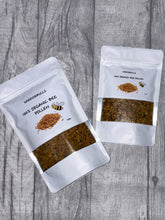Warriorbullz 100% Organic Bee Pollen 100g
Possible Indications and Benefits
Unlike honey, bee pollen is a product of bees that’s still widely misunderstood. But this nutrient-dense powerhouse supplement is packed with vitamins, minerals, trace minerals, protein and fats – and it’s a great dietary addition for both humans and their canine companions.
It has one of the most complete nutritional profiles in the world, made up of 35% protein and 50% carbohydrates. It’s also high in chromium, cobalt, niacin, phosphorus, potassium, selenium, zinc, iron, folic acid, and much more!
Where does it come from?
Bee Pollen is gathered by worker bees and mixed with nectar and bee saliva. The bees then pack this “blend” into a granule that adheres to their back legs, and carry it to the hive where it’s used to feed the colony.
In the hive, the collected pollen, dampened with saliva and fragmented by flightless bees, is packed in honeycomb cells. Next, the surface of the collected pollen is covered with a thin layer of honey and wax. The substance which has been created is 'bee bread' which undergoes anaerobic fermentation and is preserved thanks to the arising lactic acid. Bee bread constitutes the basic protein source for the bee colony. Moreover, it is also the source of nutritional and mineral substances for royal jelly produced by worker bees (5)
The type and quality of pollen varies by location, plant source, and weather. It’s not uncommon for pesticides and/or heavy metals to influence the quality of the pollen, so it’s important to know your source. Warrior Bullz Pollen is organic.
The benefits
The health benefits of bee pollen are numerous. Antioxidants of resveratrol, flavanol and lycopene found in bee pollen, along with vitamins A, B, C, K and E help to ward off infections by strengthening the bodies immune system.
Bee Pollen also contains a variety of fatty acids. Essential fatty acids are the most predominate of these – approximately 70% of which are Omega-3 fatty acids (Alpha-linolenic acid) and 5% Omega-6 (linoleic acid), which is necessary for growth in dogs and cats. The remaining percentage is monounsaturated and saturated fats.
Nearly a dozen major enzymes and several thousand minor enzymes and co-enzymes in bee pollen help with food digestion and absorption of nutrients while regulating the immune system.
The health-enhancing value of bee pollen is expected due to the wide range of secondary plant metabolites (tocopherol, niacin, thiamine, biotin and folic acid, polyphenols, carotenoid pigments, phytosterols), besides enzymes and co-enzymes, contained in bee pollen. (3)
In addition
- It’s hepato-protective – It protects and promotes a healthy liver, and assists in the healing process for a compromised liver. This makes it a good option for dogs who need to detox.
- It boosts metabolism.
- Allergy protection – Bee pollen contains Quercetin, a natural antihistamine. When taken regularly, it may help reduce allergy as can local honey. In animals I believe the biggest benefits is orally. Pollen reduces the presence of histamine, decreasing symptoms. Dr. Leo Conway, M.D of Denver Colorado, reported that 94 percent of his patients were completely free from allergy symptoms once treated with oral feeding of pollen.
- Improves blood flow to the nervous system helping to relieve stress and anxiety.
- It contains trans-cinnamic acid, which is a natural antibiotic.
- It contains the plant pigment rutin, which offers cardiovascular support. This helps strengthens blood vessels and capillaries and is an natural anti-inflammatory.
- Gram for gram, it contains more amino acids than beef, fish or eggs.
- Immune Support. There are many nutrients in the pollen which can help boost the immune system. Dr Mercola of mercola.com claims that bee pollen has antibiotic-type properties that can help protect the body from contracting viruses. It’s also rich in antioxidants that protect the cells from the damaging oxidation of free radicals.
- Bee pollen contains multiple enzymes which are believed to help in digestion. The enzymes help your pet break down the food properly, so they can get all the nutrients from the food.
Suggested Feeding amounts
Bee pollen can be added daily to your cat or dog’s food. The recommended amount for a 20 kg dog is 1 teaspoon per day.
Start with about a third of this, and gradually increase to ensure he doesn’t have a sensitivity.
Cats 1/4 teaspoonful daily.
It does not have to been given in exact amounts or every day.
